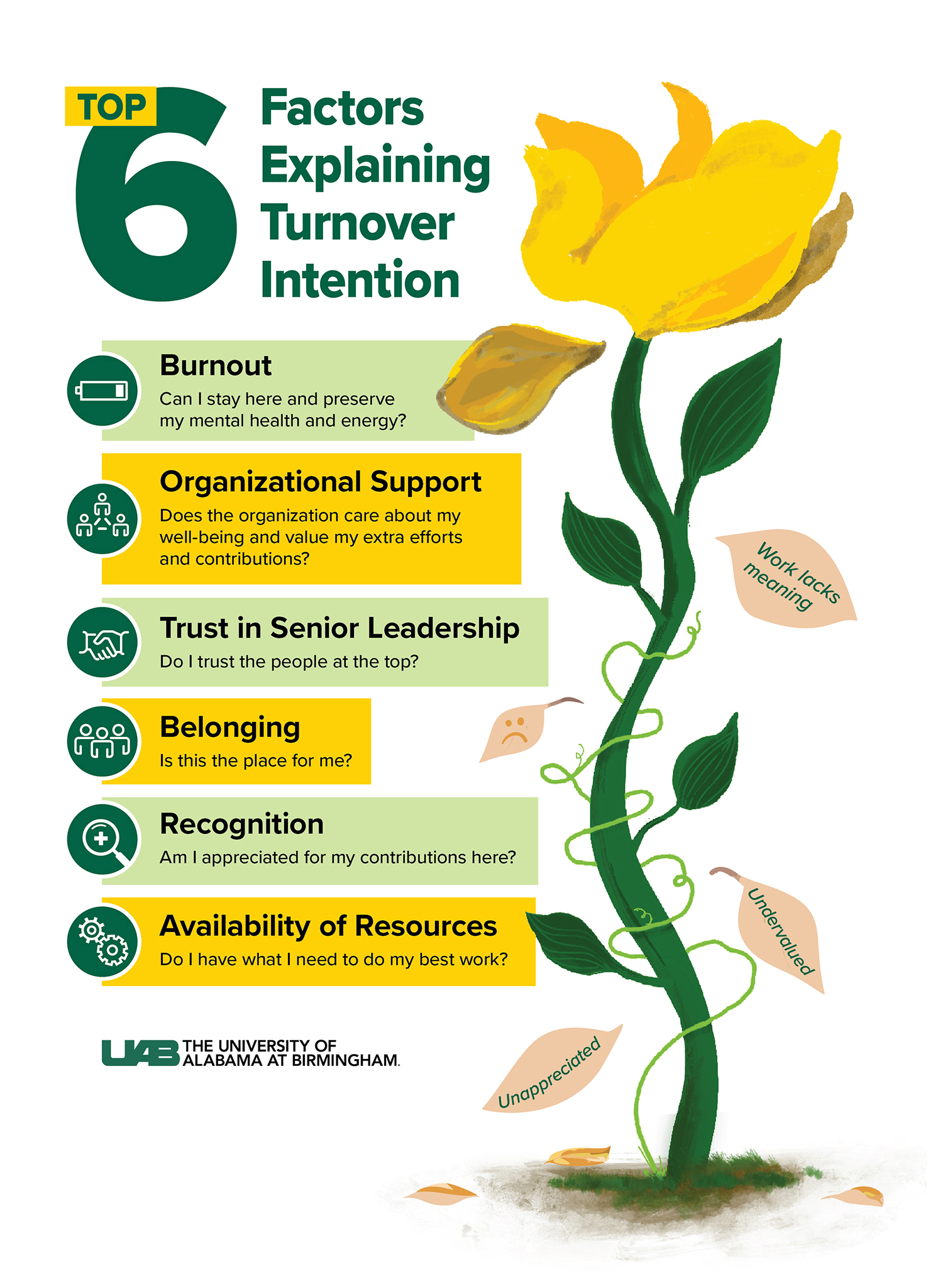 Meese says trust in senior leadership emerged as a critical factor, overshadowing the influence of direct managers in retaining employees.
Meese says trust in senior leadership emerged as a critical factor, overshadowing the influence of direct managers in retaining employees.
Graphic by: Jody Potter
Click image to enlarge.New research from the University of Alabama at Birmingham shows a significant workforce reshuffling is underway as people increasingly seek environments where they feel valued and appreciated. Amid this backdrop, a recent study is shedding light on the crucial factors for retaining employees.
Conducted by a team led by UAB Department of Health Services Administration Assistant Professor Katherine Meese, Ph.D., the study, published in the Journal of Multidisciplinary Healthcare, surveyed over 4,400 health care workers to delve into the dynamics of employee turnover and organizational support. These findings underscore the importance of perceived organizational support in fostering a positive workplace environment, transcending the boundaries of individual health care institutions.
“Time is short, right? People witness others’ falling ill, receive distressing news and consequently begin to reassess their priorities,” Meese said. “They start to question how they spend their time.”
Meese says that, as a result, people have begun to value different things. Many individuals undergo a process of realization, deciding not to remain in environments where they feel undervalued or unappreciated or where their work lacks meaning.
“This has led to a significant reshuffling of employees, as they seek out environments they hope will provide a better experience, or at least one that isn’t worse,” Meese said.
In the study, Meese says trust in senior leadership emerged as a critical factor, overshadowing the influence of direct managers in retaining employees.
“These findings are significant because much of the work revolves around supervisors and managers,” Meese said. “However, what we’re truly observing is that the senior-most leaders hold considerable influence over decisions to stay or go.”
She says another perspective to consider is that, even if an individual has a strong relationship with their direct manager, if they lack trust in the leadership above, they will not feel secure there, and they may not remain hopeful that conditions will improve in the future.
Communication breakdowns and misconceptions were identified as potential threats to trust in senior leadership, impacting employee retention.
She says the main factors that predict whether people plan to leave or fail to recommend the organization are not financial. They are durable, work culture elements and leader behaviors that boil down to six key issues:
- Burnout – Can I stay here and preserve my mental health and energy?
- Organizational Support – Does the organization care about my well-being and value my extra efforts and contributions?
- Trust in Senior Leadership – Do I trust the people at the top?
- Availability of Resources – Do I have what I need to do my best work?
- Recognition – Am I appreciated for my contributions here?
- Belonging – Is this the place for me?
Strategies such as effective rounding and leader visibility contribute significantly to building trust and a sense of belonging among health care workers, and can also apply to non-medical organizations, while collaboration between different units and recognition play pivotal roles in fostering trust in senior leadership, according to Meese.
She says the study’s insights come at a crucial time as health care institutions and other organizations grapple with workforce retention amid the ongoing challenges of the pandemic. As accountability remains essential for maintaining standards of behavior and retaining top-performing employees, a balance between setting standards and acknowledging job market dynamics is necessary to overcome challenges in accountability without compromising morale.